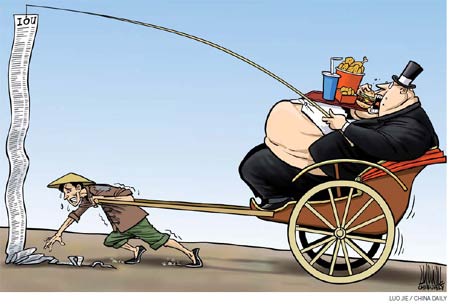Debt crises lower growth expectations
Foreign trade, economic growth will be hindered
Anew round of debt crisis is spreading across the world. Standard & Poor's downgraded the United States' credit rating from 'AAA' to 'AA'+, reflecting the agency's concern over the world's largest economy's debt problems.
The European Union's debt crisis keeps worsening.
 |
News reports reveal Italy and Spain might not be able to repay their debts on time. Since the two countries are larger economic entities than Greece and Portugal, people are worried that the scale of debt is beyond the EU's capacity to repay.
The crises are evident by the continuous downward spiral of the global stock markets, including the US and EU markets.
Although the causes of the crises are largely different from those of three years ago, they will still have a strong, negative effect on China's economy.
First of all, the downgrade of the US credit rating will directly shrink China's foreign exchange reserves. As the country with the world's largest foreign exchange reserves, China is now in possession of reserves worth $3.2 trillion (2.2 trillion euros). Among them, 70 percent are in US dollars with a majority stake in the US' debt.
The downgrade of its credit rating further lowers the market value of the current bonds. Also, investors will likely dump their reserves of US dollars and bonds, which will be a hard hit to China's foreign exchange reserves.
In addition, the debt crises in the US and EU will have a direct effect on China's foreign trade, consumption and investment, which are the three main elements that drive the growth of China's macro economy.
In a crisis, the economies of Western countries will be weak for a long time, which will largely affect their demand for imports from China. Although China has adjusted its foreign trade strategy since the 2008 financial crisis by increasing the dependence on emerging markets, the US and the EU are still the main importers of Chinese goods.
If these countries' recovery slows or even drops into a deeper depression, the recovery of China's foreign trade volume and growth rate will be severely hindered.
In the short term, there will be large, negative effects on the employment level of export-oriented companies in China, which could result in social unrest.
Also, international hot capital might flow into the Chinese market. Some countries have already employed policies against the appreciation of their currencies, because they are worried about the fast depreciation of the US dollars and the euro. The yuan, which is appreciating, may be attractive to some investors. China's consumer price index rose to a 37-month record high of 6.5 percent in July. The pressure of inflation will be heavier if overseas hot money comes into Chinese markets and are transformed into domestic currency, which will largely restrain the growth of China's domestic consumption.
Under the likelihood that both foreign trade and consumption are weak, the Chinese government will also face difficulties in formulating investment policies. Investment, foreign trade and consumption are normally the three pillars of China's economy.
After the 2008 financial crisis, investment was at the top of the list. The 4 trillion-yuan (434 billion euros) stimulus plan was meant to jump-start investment in infrastructure construction. With the 12th Five-Year Plan (2011-2015) in place, the central and local governments' investment plans have just begun. The next steps of the macro policies will decide the economic performance of China's economy.
China is under severe internal and external economic pressures. Unless the process of economic restructuring is better than expected and people's consumption capabilities rapidly grow, we might have to lower our expectations toward economic growth of next year, or even the year after.
The author is an independent economics commentator.
























